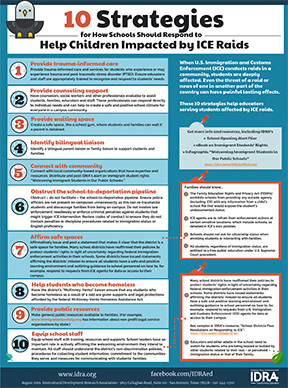 When U.S. Immigration and Customs Enforcement (ICE) conducts raids in a community, students are deeply affected. Even the threat of a raid or news of one in another part of the country can have painful lasting effects. To help educators serving students affected by ICE raids, see the strategies below (updated January 2025).
When U.S. Immigration and Customs Enforcement (ICE) conducts raids in a community, students are deeply affected. Even the threat of a raid or news of one in another part of the country can have painful lasting effects. To help educators serving students affected by ICE raids, see the strategies below (updated January 2025).
See PDFs: English • Spanish • English-Korean
Provide trauma-informed care and services for students who experience or may experience trauma and Post-Traumatic Stress Disorder (PTSD). Ensure educators and staff are appropriately trained to recognize and respond to students’ needs.
Have counselors, social workers and other professionals available to assist students, families, educators and staff. These professionals can respond directly to individual needs and can help to create a safe and positive school climate for everyone in a campus community.
Create a safe space, like a school gym, where students and families can wait if a parent is detained.
Identify a bilingual parent or family liaison to support students and families.
Connect with local community-based organizations that have expertise and resources. Distribute and post IDRA’s alert on immigrant student rights “Welcoming Immigrant Students in School.”
Obstruct – do not facilitate – the school-to-deportation pipeline. Ensure police officers are not present on campuses unnecessarily as this can re-traumatize students and discourage families from being on campus. Do not involve law enforcement needlessly or enforce criminal penalties against students that might trigger ICE intervention. Review Codes of Conduct to ensure they do not contain penalties or discipline procedures related to immigration status or English proficiency.
Affirmatively issue and post a statement that makes it clear that the district is a safe space for families. Many school districts have reaffirmed their policies to protect students’ rights in light of uncertainty regarding federal immigration enforcement activities in their schools. Some districts have issued statements affirming the districts’ mission to ensure all students have a safe and positive learning environment and outlining guidance to school personnel on how to, for example, respond to requests from ICE agents for data or access to their campus. (See samples in IDRA’s resource, “School Districts Pass Resolutions on Responding to ICE”). Families should know:
-
-
- The Family Education Rights and Privacy Act (FERPA) prohibits schools from providing any outside agency (including ICE) with any information from a child’s school file that would expose the student’s undocumented status.
- While the U.S. Department of Homeland Security, on January 21, 2025, removed long-standing restrictions on immigration enforcement in “sensitive locations,” including schools, school personnel still have no legal obligation to enforce immigration law.
- Schools should not ask for citizenship status when enrolling students or interacting with families.
- All students, regardless of immigration status, are entitled to a free public education under U.S. Supreme Court precedent.
-
Have the district’s “McKinney-Vento” liaison ensure that any students who become homeless as a result of a raid are given supports and legal protections afforded by the federal McKinney-Vento Homeless Assistance Act.
Make general public resources available to families (For example, www.immigrationlawhelp.org has information about non-profit legal service organizations by state.)
Equip school staff with training, resources and supports. School leaders have an important role in actively affirming the welcoming environment they intend to maintain. All staff should understand the district’s non-discrimination policies, procedures for collecting student information, commitment to the communities they serve, and measures for communicating with students’ families.
-
-
- Many school districts have reaffirmed their policies to protect students’ rights in light of uncertainty regarding federal immigration enforcement activities in their schools. Some districts have issued statements affirming the districts’ mission to ensure all students have a safe and positive learning environment and outlining guidance to school personnel on how to, for example, respond to requests from U.S. Immigration and Customs Enforcement (ICE) agents for data or access to their campus. (See samples in IDRA’s resource, “School Districts Pass Resolutions on Responding to ICE.”
-
-
-
- Educators and other adults in the school need to watch students who are being teased or bullied by other students related to their real – or perceived – immigration status or that of their family. Staff should be prepared in ways to intervene appropriately.
-
Get additional information and resources at IDRA’s Education of Immigrant Children web section.





